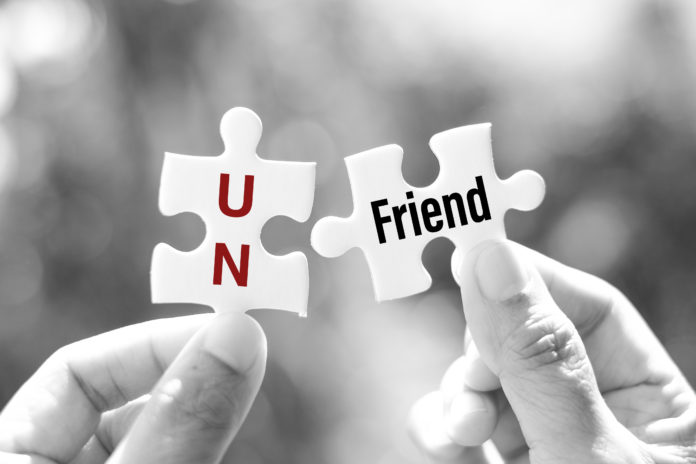Part of my sermon preparation this past week was spent digging into my etymological dictionary because I like to know where words come from. I found out the Latin word from which we get our word “enemy” translates literally as “an unfriend.” That new understanding shaped how I looked at Jesus’ familiar admonition to love our enemies from Luke 6. A few days later, I read Pádraig Ó Tuama’s newsletter that made the same observation as he introduced the latest episode of On Being—just one of the things I want to talk about with him when I finally get to sit down with him over dinner or beers or something.
Here’s the sermon for this week.
___________________________________________
Love your enemies.
Those words loom so large that they are almost hard to take seriously.
I started by trying to think of those whom I would consider enemies. As a lifelong Red Sox fan, I suppose one answer is obvious, but it feels almost too easy, and I guess I would say I don’t really hate the Yankees I just hope they lose. Every time.
My next question was to think about who the enemies were for the people Jesus was speaking to, and in that case the Romans would have been the ones in pinstripes. They were the oppressors, the occupiers, the ones standing on the necks of the Jewish people. When Jesus said if you got hit in the face, turn the other cheek, his example was not totally metaphorical, I’m guessing. He was standing in a field surrounded by a crowd of people who had gathered because of what he said and what he did—and I don’t imagine it was a quiet crowd. I’m sure the Roman authorities had it well policed. Jesus might have even been able to see some of the soldiers as he spoke.
Often, violence gives birth to violence. Part of the strategy of oppression is to divide those you wish to conquer. As the years passed, there were significant political and theological divisions among the Jewish people that created enemies as well. And Jesus was talking to a whole bunch of people who lived in small towns where they had histories that had also created hurts and difficult memories creating enemies with a lowercase letter rather than a capital E.
Our word enemy comes from a Latin word that literally means “an unfriend.” I smiled when I read that because, thanks to Facebook, we first learned to “friend” people—to let them in our circle—and then to “un-friend” them when it was necessary. But the Latin word is a noun, not a poorly-created verb; an enemy is an unfriend—someone who unloves you, and you them.
What makes someone our enemy?
Jesus started the list when he said, “Love your enemies, do good to those who hate you, bless those who curse you, pray for those who abuse you.”
Some other translations add greater nuance: Value your enemies as people created in the image of God, act honorably towards those detest you, bless those who say bad things about you, pray for those who threaten you.
That translations differ between those who abuse you and those who threaten you call me to an important point before I continue. Jesus was not saying people who are in abusive relationships should stay there and “love their enemies.” If you or someone you know are in a situation where they are physically or emotionally or sexually abused, you are not called by God to stay there.
As I read Jesus’ words, I started my own list: oppression, perceived difference, perceived threats to our comfort or our worldview, disagreement, insecurity, fear, ignorance.
As I have told you, I grew up in Africa. The first time I remember being in America, I was five years old. My father was preaching at a church and I was walking with him outside of the building when one of the deacons stopped him and said, “You’re crazy as hell for going to Africa and preaching to those n—–s.”
My father was caught off-guard and said, “What?” and the man repeated what he had said. Then my dad told me later that I looked up at the man and said, “Mister, do you know any of them?” (Even in my childlike innocence, I had already learned that the world divided into Us and Them.)
The man was then caught off-guard and said, “What?” to me.
“Do you know any Africans?”
“Of course not,” he said.
My father said I smiled and replied, “That’s too bad. They’re really nice.”
The man looked at me and then at my father and said, “Your kid is crazy as hell, too.”
The lesson that felt natural to me as a little kid, and that I have had to relearn over and over, is that we have to humanize people if we are going to love them. There is no Them; there is only Us. When we allow ourselves to label others as Them, for whatever reason, we are creating unfriends. If we can dismiss someone, or a group of people, with a label we are creating unfriends. To begin to learn how to love our enemies is to allow them to be more than the caricatures we have allowed ourselves to hold. Remember, Jesus didn’t say, “Get your enemies to love you.” He was talking about how we open our hearts, how we grow more fully into the image of God that we are. We have to think about new ways to talk to and about them if we are going to change how we feel about them, which is another way of remembering that love is a creative act. To love someone—particularly someone we have not chosen to love before—creates new possibilities. We could even go so far as to say it redefines the universe.
So I will: when we love your enemies, we redefine the universe.
Just as God, who is Love, spoke the universe into being, so we create a new universe of possibility when we speak (and act in) love where there has been none; we create hope beyond the hurt and fear and damage and ignorance that divides us.
At the end of our passage, Jesus says something that is most often translated as “the measure you give is the measure you’ll get back,” that makes him sound like the Beatles: “And in the end the love you make is equal to the love you take.” But Jesus actually uses the same word three times, so that it reads, “For by the measure you use to measure, it will be measured in return to you.”
Jesus started with, “Love your enemies,” moved to, “Do unto others as you would have them do unto you,” and then went down a list of several different ways of saying, “Don’t respond to violence with violence if you want to be a catalyst of love in the lives of those around you,” which makes me wonder if we might not hear that last verse this way:
“Remember the way you measure and size up those around you is the way you are going to get sized up as well.”
If we want to go through life acting like a bad piano teacher who seems to relish telling everyone what they have done wrong, then we will be judged by our mistakes and shortcomings. If we don’t have kind words to say to others, we should not expect to receive any–even more, we should not expect that people will think we are kind. If we respond to those we deem as our enemies with violence and vitriol because that is what they throw at us, why would we expect that they would think we are any different than them?
But if we value our enemies—those we think of as Them—as people created in the image of God, act honorably towards those who detest us, bless those who say bad things about us, and pray for those who threaten us, we will be measured by our kindess and grace. Like the old song says, they will know we are Christians by our love.
Still, I think it would have helped if he had said, “Try to value your enemies as people created in the image of God,” because love like this doesn’t just happen. It has to be practiced day after day.
In my twenties, my parents and I became unfriends to one another. It’s hard to say we were enemies, but we struggled to have a relationship. We all felt hurt and we hurt each other in our words and actions. I married Ginger in my early thirties. The divide with my parents deepened. One day in my late thirties, Ginger said, “I have an idea. We are never going to get to have the big talk that clears everything up between us and your parents. So why don’t we let that go and just start from scratch. Pick a day of the week, call them, and do these things: Say hello; how are you? What did you do this week? Here’s what I did this week; I love you; Goodbye.
I started calling every Saturday morning. I didn’t explain what I was doing, I just called and went down my list. It was awkward at first, but then it became part of my week. Of our week. And then it grew into longer calls and then calls when it wasn’t Saturday. We learned how to humanize one another. To love one another. But here’s what I mean when I say we have to practice loving. It took four or five years of Saturday calls to break down the barriers we had built over many, many years.
Love your enemies. Try to love your enemies. Take it a day at a time.
Let love be the measure of your life. It is the measure that matters most. Amen.
Peace,
Milton







Wonderful & very helpful. Thanks.
Ahh Milton! So much of my life feels devoid of spirituality. I am so grateful for your sermons.
Thank you for a message of hope and understanding. Your words nourish my soul.
Thank you, Milton. Your response as a 5 year old is positively stunning.
Many years ago, when George H.W. Bush sent troops into the desert – was that Desert Storm? – our kind associate pastor prayed for peace for the mothers, ON ALL SIDES, and the fathers, ON ALL SIDES, and the sisters and brothers, ON ALL SIDES… you get the drift. It was beautiful and powerful. When the service was over, one very enraged member of the congregation held up the hand shaking line for a long time in order to harangue this dear minister. He began by spitting out the words “we do NOT. PRAY. FOR. OUR. ENEMIES.” He held a grudge against that minister for a very long time. It was so awful that another member standing behind him wrote a letter to the chairman of the administrative board commending the minister for his response.
Was explaining to my mother what it’s like on Sundays, when I play soccer with an international crowd by the college & it’s the United Nations of pickup games. This week we had about 16 countries represented. You can’t feel anything but love in spite of some ridiculous (but good natured) trash talk in multiple languages. But this is all easy – we’re playing a game for fun.
The hard part for me is being surrounded by sadly-misinformed co-workers all week, some of whom rail against “socialism!” while working in state government at the highway department… which is heavily reliant on Federal funds, of course. The next rant will be about homeless people… and I just am all out of patience to try to preach empathy to these folks anymore. Most days.
But I haven’t totally given up. Small steps.
Thank you, Milton, this was lovely, and hard to put into practice – but I shall try.